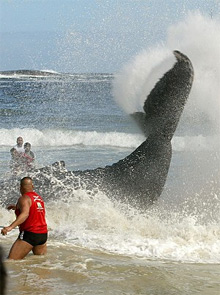 |
 |
 |
 Editorials | Environmental | March 2006 Editorials | Environmental | March 2006  
Whales in the Way of Sonar
 NYTimes NYTimes


| | Why whales strand themselves on beaches remains a mystery. (Vanderlei Almeida/AFP) |
The debate over whether the Navy's use of sonar to detect submarines is harming whales and other sound-sensitive species is back again. This time the battleground is the waters off the southeastern United States, where the Navy hopes to establish a training area for sailors who need to practice their sonar skills in a shallow ocean environment. The plan has aroused justifiable concern not only from environmental groups, but also from the federal and state agencies responsible for protecting marine life. If these concerns cannot be allayed, the project should be denied a permit to proceed as now planned.

The Navy's favored site is an area off the coast of North Carolina — 500 square nautical miles — but the Navy would settle for backup sites off Virginia or Florida if its first choice is rejected. In a draft environmental impact statement, the Navy argues that the training sites would have negligible impacts on marine life, but that judgment looks far too rosy.

The National Oceanic and Atmospheric Administration has expressed "significant concerns" about the proposed sonar activity, including its potential to injure or kill beaked whales, which are especially sensitive, and its possible adverse impact on right whales, a highly endangered species. The agency also contends that the sound thresholds the Navy deems acceptable are well above the levels known to disrupt marine mammal behavior in the wild. Florida's fish and wildlife agency went so far as to urge that the project be abandoned, and North Carolina's marine and wildlife agencies weighed in with their own concerns.

No one can deny that the Navy needs to conduct sonar training in shallow waters, where sound propagates differently than in the deep ocean. But at a time when evidence is mounting that sonar has been responsible for at least some of the whale strandings around the world — and when we do not yet know what caused a large stranding last year in North Carolina — it behooves the Navy to move with extreme caution.

The three sites favored by the Navy were chosen for practical reasons: they were close to home ports, air stations and federal shore facilities; had appropriate water depths; and had a satisfactory climate. Whales were at best an afterthought, but they deserve to be a priority. | 
 | |
 |



